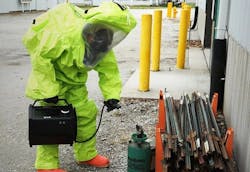Military researchers choose FLIR Systems to develop lightweight electro-optical chemical-detection sensors
ARLINGTON, Va. – U.S. military experts involved in countering weapons of mass destruction needed next-generation chemical detection technology. They found their solution from FLIR Systems Inc. in Wilsonville, Ore.
Officials of the Defense Threat Reduction Agency's Joint Science and Technology Office (DTRA JSTO) in Arlington, Va., have announced a contract potentially worth $8 million to FLIR Systems for chemical-detection technologies based on ion mobility spectrometry (IMS) and mass spectrometry (MS) technology.
FLIR will team with Purdue University in West Lafayette, Ind. to develop ion mobility design and two-dimensional mass spectrometry (2D MS/MS) into a modular chemical-detection system.
Related: Leidos eyes active infrared spectroscopy chemical detection for weapons, poisons, narcotics
It will be lightweight enough for one person to carry that can screen downrange areas for the presence of harmful chemicals. The system will function as a sensor payload for unmanned vehicles, and as an embedded real-time monitor for chemical releases.
The program's goal is to provide warfighters with small, fast, interconnected chemical detection and identification tools for a wide range of scenarios.
Experts from FLIR and Purdue will work together to develop chemical-detection sensors that collect large amounts of data from one sample and remove the need for pre-recorded data libraries of known threats.
Related: Air Force chooses third company for active infrared spectroscopy chemical detection
Advanced algorithms will enable analysts to identify and classify never-before-seen threats with modular front-ends and options for communication protocols and power inputs for a broad range of detection missions.
The three-year effort will result in a mature integrated IMS/MS prototype ready to move into military programs of record, experts say. FLIR and Purdue will do the work in West Lafayette, Ind.
For more information contact FLIR Systems online at www.flir.com, Purdue University at www.purdue.edu, or DTRA JSTO at www.dtra.mil.
